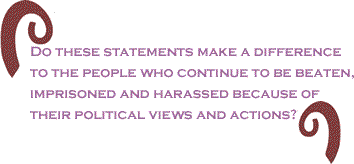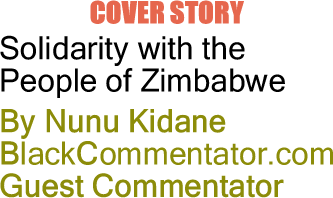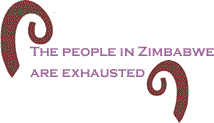
|
||||||||||||||||||||||
 |
||||||||||||||||||||||
 |
||||||||||||||||||||||
 |
||||||||||||||||||||||
 |
||||||||||||||||||||||
 |
||||||||||||||||||||||
 |
| The current issue is always free to everyone |
|
Nunu Kidane was Mark's guest Thursday, June 26, 2008 |
 |
Daily accounts from I'm
sure none of what I'm saying here comes as news to any of you
who follow the news from When a democratic space such as this (with all its shortcomings) has been closed for the millions of Zimbabweans who had eagerly been awaiting for a change in regime, the frustration and anger may be manifested in street violence - as was the case in Kenya. It is possible (in fact many analysts predict) that there will be no such violent eruptions. If violence from the people were to take place, we would have seen the escalation in retaliation by Zimbabwean populations by now. I hope their optimism is the reality that is yet to unfold.
But,
what can we do, those of us in the Here is one way that I find helps. Contributions to the Zimbabwe Solidarity Fund. The
Fund was organized by civil society organizations in the The contributions are from individuals in the US who send in what they can, even as small as $5 and $10 are encouraged - to ensure that those who are imprisoned are provided legal assistance to secure their release, to ensure that while they are detained, they are treated fairly, that they are fed and receive immediate medical attention from the beatings they've endured. That is what the funds will be used for. As
I write this, I'm sitting in my office surrounded by images
of posters from people's protests from I
hope it will not take another decade or more for the Mugabe
regime to end, the people in BlackCommentator.com Guest Collumnist, Nunu Kidane is an activist from Eritrea, East Africa. She is currently the Network Coordinator with Priority Africa Network (PAN), a coalition of 26 (Oakland, CA) Bay Area organizations that promote Africa through education and advocacy. She has a B.A. from UC Berkeley and has worked for over fifteen years in program and policy development in Eastern and Southern Africa. She has written and spoken on topics such as HIV/AIDS, debt cancellation, migration, resource extraction and human rights in Africa and is an advocate on racial justice globally. She is a member of the Coordinating Committee of Jubilee USA Network, a Board Member of Casa Segura, and a member of The League of the Transnational Institute for Grassroots Research Action (TIGRA), Advisor for Women of Africa (WAFRICA) and a member of the Africa Committee with the American Friends Service Committee (AFSC). Click here to contact Ms. Kidane. |
Any BlackCommentator.com article may be re-printed so long as it is re-printed in its entirety and full credit given to the author and www.BlackCommentator.com. If the re-print is on the Internet we additionally request a link back to the original piece on our Website. Your comments are always welcome. eMail
re-print notice
If you send us an eMail message we may publish all or part of it, unless you tell us it is not for publication. You may also request that we withhold your name. Thank you very much for your readership. |
|
| June
26, 2008 Issue 283 |
|
| Executive Editor: Bill Fletcher, Jr. |
| Managing
Editor: |
| Publisher: Peter Gamble |
| Est. April 5, 2002 |
| Printer Friendly Version in resizeable plain text format or pdf format. |
 |
 |
 |
| |
| |






















 As
I continue to engage in analysis and reflection with collogues
and read the latest news, I feel a sense of discontent as we
sit here, unable to do anything to contribute in some meaningful
way to bring about positive change to the hundreds of civilians
in Zimbabwe who are suffering, not only from the violence perpetuated
against them by ZANU-PF, but also from the pain of hunger and
displacement from t heir homes as they flee into neighboring
countries.
As
I continue to engage in analysis and reflection with collogues
and read the latest news, I feel a sense of discontent as we
sit here, unable to do anything to contribute in some meaningful
way to bring about positive change to the hundreds of civilians
in Zimbabwe who are suffering, not only from the violence perpetuated
against them by ZANU-PF, but also from the pain of hunger and
displacement from t heir homes as they flee into neighboring
countries.










